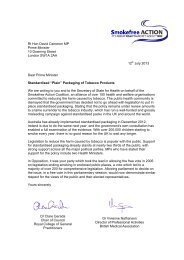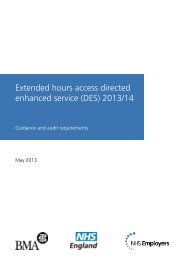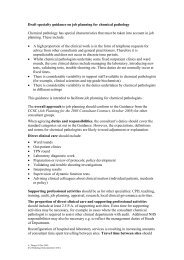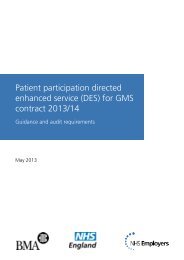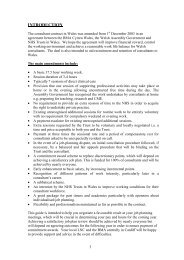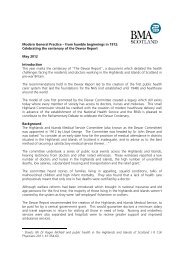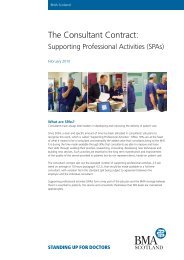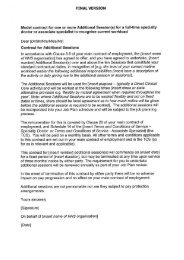The Consultant Contract and Job Planning for Emergency ... - BMA
The Consultant Contract and Job Planning for Emergency ... - BMA
The Consultant Contract and Job Planning for Emergency ... - BMA
You also want an ePaper? Increase the reach of your titles
YUMPU automatically turns print PDFs into web optimized ePapers that Google loves.
APPENDIX 5<br />
Statement by the College of <strong>Emergency</strong> Medicine about the role of the<br />
<strong>Consultant</strong> in <strong>Emergency</strong> Medicine "On Call"<br />
<strong>The</strong> College of <strong>Emergency</strong> Medicine is the professional body responsible <strong>for</strong> setting<br />
st<strong>and</strong>ards of clinical <strong>and</strong> professional practice in <strong>Emergency</strong> Medicine in the British<br />
Isles.<br />
This statement outlines the view of the CEM on this matter.<br />
<strong>Emergency</strong> Departments (ED) should have an <strong>Emergency</strong> Medicine (EM)<br />
<strong>Consultant</strong> on-call at all times.<br />
<strong>The</strong> role of the on-call EM consultant* is to provide senior clinical leadership to the<br />
ED. This will consist of providing direct clinical care to individual patients, the<br />
supervision <strong>and</strong> support of doctors in training in EM <strong>and</strong> other specialties <strong>and</strong> a close<br />
working relationship with Departmental <strong>and</strong> Trust management teams to ensure safe<br />
systems <strong>and</strong> processes are in place <strong>for</strong> all patients attending with emergency <strong>and</strong><br />
urgent conditions. A significant proportion of this work will require the consultant to<br />
be present within "normal" working hours, to enable engagement with other<br />
specialties <strong>and</strong> Trust management.<br />
An on-call EM consultant may return to the ED to provide direct senior clinical input<br />
into selected, serious cases as well as providing telephone advice on clinical,<br />
medico-legal <strong>and</strong> ethical issues. It is also expected that the consultant should be<br />
kept in<strong>for</strong>med of any significant departmental events that may represent clinical risk<br />
to individual or multiple patients, including excessive attendance numbers, unusual<br />
case mix or staffing issues.<br />
Communications of this nature will normally be dealt with by telephone advice <strong>and</strong><br />
support.<br />
<strong>The</strong> on-call EM consultant will also provide required clinical leadership in the event of<br />
“Major Incident” activation.<br />
When on-call, an EM consultant should not be recalled to hospital solely to deal with<br />
a build up of less serious cases, because of excessive waiting times <strong>for</strong> first<br />
assessment or because of potential breaches in the DH operational emergency<br />
access st<strong>and</strong>ard ("4 hour target").<br />
Each ED <strong>and</strong> hospital as a whole should be staffed <strong>and</strong> resourced to a sufficient<br />
level to manage what are predictable peaks in workload, 24 hours a day, seven days<br />
a week. Where this has not been adequately addressed by a Trust, the on-call EM<br />
consultant must not be expected to make up <strong>for</strong> any deficit in staffing or other<br />
resource.<br />
<strong>The</strong> decision whether to return to the ED or not, is one of a clinical, professional<br />
nature <strong>and</strong> should be a personal decision, made by the on-call EM consultant, in full<br />
possession of all relevant contemporaneous in<strong>for</strong>mation. It is not appropriate <strong>for</strong> a




